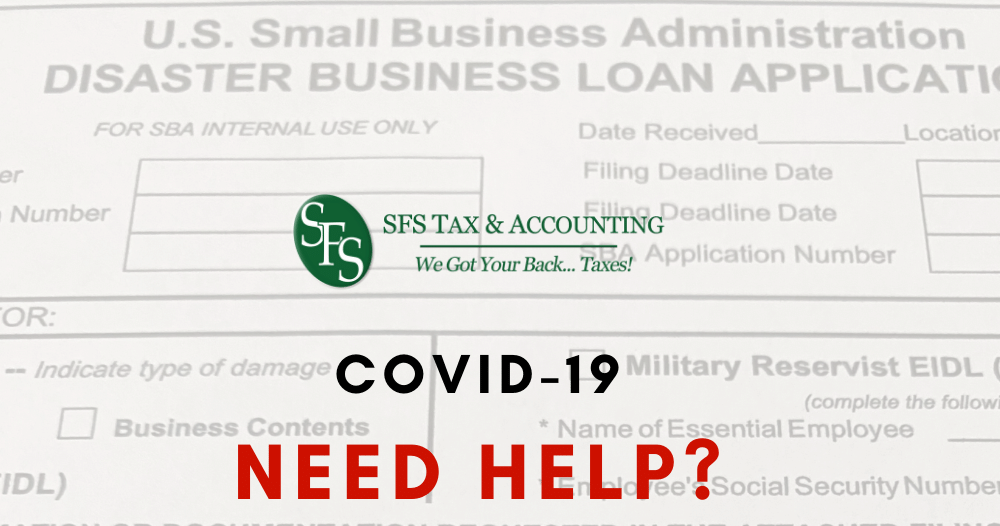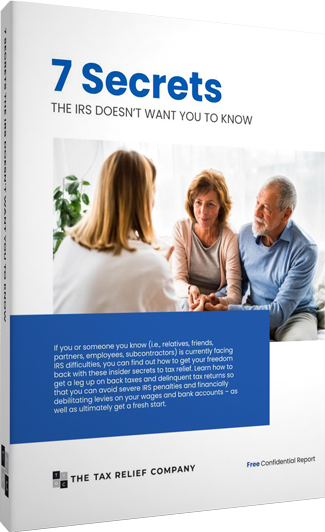COVID-19 Disaster Loan
SFS Tax & Accounting Services has an update on financial help and the latest on the Corona COVID-19 drama with financial news you can really use. COVID-19 Disaster Loan Assistance – This announcement is about Federal & State money for you, for your business and clearing up the misinformation / incorrect information that is floating about.
- Cash is King: Conserve cash. If you are down to less cash than will cover a few months of living expenses, consider cutting what is not essential. Also, if the bill can wait, you may want to consider holding off on paying certain things. Right now, you need to keep food on the table, keep the electricity and water on and keep gas in the car. Just about everything else can wait a month or two if needed; trust me, you won’t be the only one paying late. No apartment complex will kick you out if you miss April’s rent payment. Expect late fees which you may be able to get waived, but if it is down to groceries or sorting out a late rent payment in May or June, the rent can wait, same goes for mortgage and car payments. I’m not saying you can skip out on legitimate debts, what I am saying is to prioritize and if needed delay some of those things that can wait. If you are going to skip a payment, call the creditor and let them know. If you call and sort it out ahead of time, they will be far more willing to work with you than if you simply do not pay and do not communicate.
- Scammers are working overtime: DO NOT give your personal financial information to anyone, especially if initially they called or emailed you. Know who you are talking to and DO NOT TRUST ANYONE until you have verified, they are legitimate (sophisticated people get scammed too, so do not be shy about reaching out and asking for help to determine if an agency is legitimate). Scammers are slick, they use fake caller ID, they search public databases and know your address, age, etc… and will pretend to be with IRS, Social Security, FEMA, etc… to trick you into giving up your personal information and then draining your bank account or opening credit accounts in your name. People get desperate and do dumb things because the scammer told them what they wanted to hear. Please verify who you are talking to and do not just give up your personal information. Remember if it sounds too good to be true, it is!
- Am I on my own?: No, Congress, Florida FEMA, SBA and IRS all have programs to get you relief and or cash. I’ll talk about a few of those in detail.
- I got laid off, now what?: If you have been laid off, go to and apply for reemployment assistance now. In Florida you can apply online, http://www.floridajobs.org/ through the Florida Department of Economic Opportunity, however, there may be a disclaimer on the website advising the applicant of longer than average wait times. The sooner you get started, the better. Reemployment Assistance payments may not be large sums of money, but the assistance payments will help bridge the gap, especially if this situation drags on for a long time. Hope for the short term, but plan for the longer. For more information about the Reemployment Assistance Program, https://thetaxreliefco.com/wp-content/uploads/2020/03/dua-faqs-3-17-20-updates.pdf.
- IRS Deadlines: 4/15 tax deadline is moved to July 15th, on March 13th, President Trump issued an emergency declaration in response to the ongoing COVID-19 pandemic and instructed the IRS to delay the April 15th tax deadline. If you expect a refund, file your tax return ASAP and have the refund direct deposited.
- IRS is after me! If you have existing tax debt, we can get the IRS to leave you alone until this COVID emergency is over. If IRS tries to levy your bank accounts or paycheck, call us & we’ll shut them down. If you have an existing installment agreement, and you can’t afford to pay it, call us ASAP, we can help.
- What is Government doing? Congress passed & President Trump signed theCoronavirus Relief Act, which provides protection for employees impacted by COVID-19 by requiring employers to pay family medical leave and sick leave for certain periods and up to certain amounts. The bill helps fund these additional payments by offering employers a tax credit against payroll taxes.
- The DC Circus: Congress and the President agreed upon a $2 trillion corona virus stimulus bill o rush sweeping aid to businesses, workers and a health care system slammed by the coronavirus pandemic and are expected to vote on it on Wednesday, March 25, 2020.
- The Latest Rumors from DC: You will probably see Federal money to individuals in the form of checks $1,200-$1,500 per adult taxpayer and $500$1,500 per child. Nothing is settled yet but expect income phaseouts meaning if you earn too much (75-99K per individual), you will get less or nothing. As soon as we hear what the amount is going to be, we will let you know. Check our company Facebook page, https://www.facebook.com/SFSTax/ and the SFS Tax & Accounting Services Website sfstaxacct.com blogs for updates.
- Act Fast Before Its Gone! For small businesses, once Congress and the President come to an agreement, there will be 2 million per small business, or about $300 billion available in disaster assistance. Apply for an SBA (EIDL) Economic Injury Disaster loan ASAP! It is better to have it and not need it rather than to wait and then find yourself in a cash crunch. The loan will have an interest rate below 4% and can be repaid over 30 years and the first year can be deferred. It takes some time and some paperwork, so get started now. If you need help, my firm can do it for you. To get started you will need to gather up the following items:
-
- Last year’s Company tax return (be prepared for last 3 years)
- Last year’s personal tax return (be prepared for last 3 years)
- An income statement on a cash basis for 2019 and an income statement for 03/13/2019-03/12/2020 (If you have not kept your books up, get busy or call us for help)
- A balance sheet with details on all of your liabilities. (If you have not kept your books up, get busy or call us for help)
- Corporate formation documents and the date your business was created, and if possible, your CP575 letter with your Federal tax (EIN) number.
- A list of all your bank accounts and the balances, bank name address, last 4 of the account number.
- A list of all your loans & credit cards and the balances and the monthly payment amount.
- For loans, you will also need the name and address of the lender, the initial loan amount, and the monthly payment & due date and the current balance, and the projected loan maturity date. This applies to vehicles and your mortgage as well.
- You will need a value on your major assets like your home, real estate and your vehicles. Your Realtor may be able to get you a fair market value on your residence.
- You will need the policy details on your business Hazard insurance policy. Plan on at least 30 – 45 days to get funding on your SBA loan.
The Loopholes! There is an existing law with relief right now. Section 139 — added to the Code after the September 11th attacks of 2001 — allows employers to make “qualified disaster relief payments” to employees to assist the employees in managing the COVID-19 crisis. The payments are tax-free to the employees, but fully deductible to the employer.
-
-
- Section 139 provides that in a federal disaster, an employer can make a tax-free payment to an employee. In addition to contemplating the type of terrorist attack for which it was originally designed, Section 139 also applies to any “federally declared disaster” as defined in Section 165(i)(5)(A). Section 165, in turn, defines such a disaster as any disaster determined by the President to warrant assistance by the FederalGovernment under the Disaster Relief and Emergency Assistance Act.
- Beginning immediately, employers may provide tax-free payments to employees — while still claiming a full deduction for the payments — provided the payment is to reimburse or pay the employee for “reasonable and necessary personal, family, living, or funeral expenses” incurred as a result of COVID-19.
- Payments are NOT covered by Section 139 if they compensate employees for expenses that are otherwise compensated for by insurance or that are intended to replace lost income. Thus, payments of sick pay or family medical leave remain fully taxable to the employee.
- The following payments from employer to employee should be treated as deductible to the employer and tax-free to the employee, provided the expenses relate to the COVID-19 pandemic:
-
-
-
- Medical expenses of the employee that are not compensated for by insurance (for example, the employee’s deductible and out-of-pocket expenses)
- The cost of over-the-counter medications and hand sanitizer.
- Funeral costs of an employee or a member of an employee’s family.
- The costs associated with enabling an employee to work from home throughout the pandemic, including the cost of a computer, cell phone, printer, supplies, and even increased utility costs of the employee.
- The cost of an employee’s childcare or tutoring for family members that are not permitted to attend school throughout the pandemic;
-
-
Section 139 does not require that employees achieve a certain period of service before being eligible to receive tax-free payments under the provision, nor is any formal plan or documentation required to be maintained by the employer. For example, the IRS recognized that given the “extraordinary circumstances surrounding a qualified disaster, it is anticipated that individuals will not be required to account for actual expenses in order to qualify the Section 139 exclusion, provided that the amount of the payments can be reasonably expected to be commensurate with the expenses incurred.”
Despite the informality permitted by the IRS, it would be wise for employers to document their intention to make payments covered by Section 139, as well as the following:
- The amounts paid and to whom.
- The start and end date of any Section 139 “program;”
- A general listing of the expenses paid or reimbursed on behalf of the employees.
- Any maximum amount per-employee or aggregate that the employer will pay.
If your accountant, CPA, bookkeeper, tax preparer, or attorney are not familiar with Section 139 relief, give us a call, we can help.
If you need help or if you have questions, we are here for you. We want to assist our clients and the community as much as possible to get past this rough patch. Please post your questions on our Company Facebook page company Facebook page, https://www.facebook.com/SFSTax/ or go to our website,www.sfstaxacct.com or our contact us page, you can visit and post your questions there, or you can call us at 772-337-1040.
We are short staffed, and some are working remotely, thus limited on time. If you are not a client, we can give some general information and we may ask you to post your question on our company Facebook company page so everyone can benefit from the information. If you need assistance with an SBA loan, call or email us ASAP. We have to move quickly before this source of funding dries up.
Jeffrey A. Schneider, EA, CTRS
SFS Tax & Accounting Services
772-337-1040 | jeff@sfstaxacct.com



